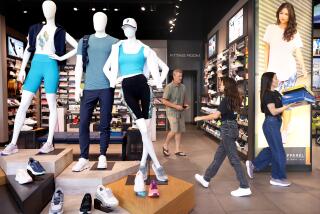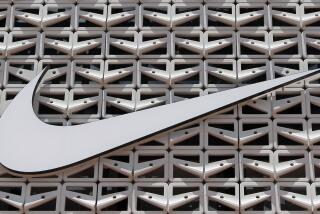K-Swiss Profit Slips, Warns of More Declines
- Share via
K-Swiss Inc., the Westlake Village-based athletic shoe maker, on Friday announced lower earnings and an expected decline in future profit. Analysts attributed the decline to an effort by a big retailer to shift more of the risk of carrying inventories to shoe manufacturers.
The admission by K-Swiss that it missed Wall Street’s profit estimates and that future earnings won’t match expectations sent its shares tumbling $4.63, or 16%, to close at $24.35 on Nasdaq.
K-Swiss executives said sales to Venator Group, its biggest customer, slipped to 16% of its revenue in the last quarter because of the change in its ordering practices. The 3,600-store Venator, owner of the Foot Locker, Lady Foot Locker, Kids Foot Locker and Champs Sports chains, accounted for 23% of the shoe maker’s sales last year.
The change contributed to a decline in first-quarter earnings of 9.9% to $6.6 million, or 63 cents a share, from $7.3 million, or 67 cents, a year earlier, the company said. Sales slid 4.5% to $68.2 million from $71.5 million a year earlier. Wall Street was looking for K-Swiss to earn 66 cents a share.
“The earnings miss wasn’t really the issue,” said John Shanley, an analyst at Wells Fargo Van Kasper Inc. in New York. “It was Venator saying that it didn’t want to take as big a risk owning inventory.”
But Steven Nichols, chairman of K-Swiss, downplayed the assessment that Venator’s changes were dramatic. Nichols speculated that the real problem was software errors at Nike Inc. earlier this year that created a surplus of athletic shoes.
“My guess is that what really changed is that Nike called up Foot Locker and said we have millions of extra shoes and we will give you 40% off,” Nichols said.
“I don’t think the basic economics of this industry has changed,” Nichols added.
K-Swiss was careful not to mention Nike during a conference call with Wall Street analysts Friday. Instead, K-Swiss Chief Financial Officer George Powlick talked about how Venator wanted to change its inventory control and buying systems to shorten its ordering time frame.
According to Shanley, Venator has told K-Swiss that it will make fewer advance orders, a change that would force K-Swiss to essentially act as a warehouse and distributor for the giant shoe retailer.
K-Swiss also announced that it expects its second quarter’s total sales to be about on par with last year and that it will earn 27 cents to 34 cents a share in the quarter, about 10% to 20% below last year.
In planning its inventories, K-Swiss has followed the traditional patterns of the shoe industry. It obtains advance orders from retailers and then contracts with manufacturing plants in China and Thailand for production.
To reduce its risk, K-Swiss even offers a “futures” program, giving retailers discounts on orders scheduled for delivery more than five months in advance. It takes about five months to fill an order and transport the shoes to Los Angeles via cargo ships from East Asia.
Venator spokesman Peter Brown declined to address the K-Swiss issue, but he did say that ordering strategies are part of “ongoing discussions with our vendors.”
“From a retailer’s standpoint, shortening the lead time is beneficial,” Brown said. “It allows a retailer to manage its inventory more tightly and more efficiently.”
Shanley said that if enforced, such a change could be a problem for giant athletic shoe companies such as Nike, which controls 42% of the market, as well as for Reebok and Adidas, with 12% and 11%, respectively, according to Sporting Goods Intelligence. K-Swiss, by comparison, has less than a 3% share.
“Nike would never know how much of a production line to put in unless it gets advance orders,” Shanley said.
However, smaller, fashion-oriented sport shoe companies such as Manhattan Beach-based Skechers U.S.A. Inc. and Santa Fe Springs-based Vans Inc. have been able to supply retailers on what Shanley called an “as-needed basis.”
On Thursday, Skechers said its first-quarter profit soared 155% to $17.1 million and sales increased 71% to $227.5 million from a year earlier.
K-Swiss was founded in 1966 by Art and Ernest Brunner, two Swiss brothers, who introduced one of the first leather tennis shoes in the United States. The shoe, the K-Swiss “Classic,” is recognized by its five strips and metal D-rings for shoelaces and has remained relatively unchanged.
Variations of the classic style still account for nearly two out of every three pairs of shoes K-Swiss sells. Nichols, a former Stride-Rite executive, gained control of the company in a 1986 leveraged buyout. K-Swiss sold its first shares to the public four years later.
(BEGIN TEXT OF INFOBOX / INFOGRAPHIC)
Downhill Runner
Shares of athletic shoe maker K-Swiss plunged 16% on Friday after it announced disappointing earnings and lowered expectations for future profit.
*
K-Swiss shares, weekly closes on Nasdaq
Friday: $24.35, down $4.63
Source: Bloomberg News
More to Read
Inside the business of entertainment
The Wide Shot brings you news, analysis and insights on everything from streaming wars to production — and what it all means for the future.
You may occasionally receive promotional content from the Los Angeles Times.











